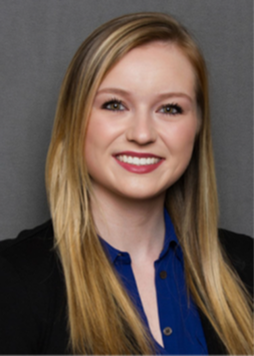
Brianna Marzolf, DO, a recent graduate of the Department of Family Medicine residency program at the University of Michigan, is one of a growing number of primary care physicians leading the charge to help her medical colleagues understand the unique needs of patients with intellectual and developmental disabilities (IDD). And she is tackling her ambitious plans in a big way.
Marzolf is the inaugural fellow for the newly established Disability Health Fellowship at the University of Michigan’s Department of Family Medicine. It will be directed through the MDisability program, which helps to train the next generation of family medicine physicians to provide the best quality primary care for patients with different types of disabilities. MDisability is a collaborative family medicine program focused on improving the primary care of people with disabilities through medical education, research, clinical care and community partnerships.
“My passion and long-term career goal is to transform how the medical field cares for persons with disabilities. The University of Michigan Family Medicine Department shares the same goal,” Marzolf said. “This is the reason why the program was my top choice for residency, and why I feel honored and enthusiastic to stay on as Michigan Medicine’s first Disability Health Fellow.
Marzolf will use her fellowship to hone her clinical skills including tailoring health maintenance/preventative care visits; management of behavior changes related to pain; depression, social isolation, life transition, managing caregiver burnout, and goals of care for those with IDD.
She also plans to collaborate with mentors from various departments at Michigan Medicine, not only in Family Medicine but also in Physical Medicine & Rehabilitation, Neurology, Genetics, Psychiatry, and Community Mental Health. Additionally, she is developing a residency curriculum and will provide and coordinate several presentations to residents and faculty over the next year. Furthermore, she hopes to conduct disability health research and policy work.
A unique clinic for patients with IDD
As part of her fellowship training, Marzolf is establishing the I-CARE for IDD clinic, which is one of the first specialized clinics in Michigan to care for those with intellectual and developmental disabilities. The clinic is being established at Michigan Medicine’s Chelsea Health Center.
“The goal of the I-CARE for IDD clinic is in the name, to Improve Care, Access, Resources, and Experiences (I-CARE) for Adults with Intellectual or Developmental Disabilities (IDD),” she said.
Physicians across Michigan Medicine will be able to use the I-CARE for IDD clinic as a consult resource. Marzolf will follow patients in the I-CARE clinic for several visits (with virtual visits as an option); collaborate with a multidisciplinary team; and offer suggestions to a patient’s acting PCP.
She wants to build this multidisciplinary team to include social work, psychology, psychiatry, physical medicine and rehabilitation, and pharmacy experts. She also wants to offer “e-consults” in the future and expand the consult service to patients outside of Michigan Medicine and across the state.
Medical students and residents of any specialty will have the opportunity to work and learn in the I-CARE clinic, Marzolf added.
Her inspiration for her research and clinical practice
Marzolf said she was inspired to work as a clinical and research advocate for those with IDD by her cousin Will, who was born with Down syndrome and needed open-heart surgery soon after his birth. Marzolf, who was only 10 years old at the time, said she and family members felt fear and worry about his medical condition. It was the first time she thought, ‘I wish I could do something to help.’
In high school, she worked at a camp for children and adults with disabilities, which fueled her passion to care for those with disabilities.
“I could see that the adults got less attention than the younger kids, which also happens in the education system and the medical system as patients with disabilities age,” Marzolf said. “I realized that the families of these campers must be tired – tired of having to fight for every service, or medical test, or school accommodation. I knew that I wanted to help.
“During medical school and residency, I continued to observe inequitable care,” she added. “I now realize that when doctors see a patient with IDD, many feel the same way my family felt when Will was first born, overwhelmed and underprepared. I want to help change that.”
Marzolf found great mentors in the MDisability program during her residency training. Those mentors allowed her to conduct research and tailor her residency to what she was interested in. Together, she and her MDisability colleagues are working on getting medical students, residents and practicing doctors prepared to care for and accommodate patients with IDD.
“There is an enormous amount of work to be done to improve healthcare for persons with disabilities, and sometimes it can feel overwhelming,” Marzolf said. “Being part of the MDisability team reminds me that I am not alone in this mission, and with their support, motivation and collaboration, I am confident we will transform the way the medical field cares for persons with disabilities.”
Attend the MDisability Provider Webinar Series, featuring Dr. Brianna Marzolf:
Marzolf will be the guest speaker at the September MDisability Provider Webinar Series from noon-1 p.m. on September 14. Her presentation, “The Health Maintenance Exam for an Adult with an Intellectual or Developmental Disability,” will include communication tips; current IDD-specific screening recommendations; a focused review of bodily symptoms and questions addressing breathing, choking/swallowing, and constipation; how to conduct a focused physical exam for patients with disabilities; and syndrome-specific screening recommendations. Register for the free MDisability Provider Webinar here.


